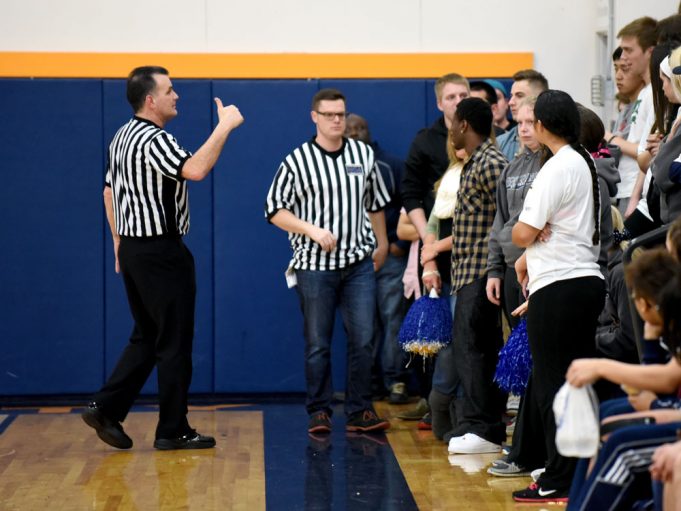The times have changed in sports and officials know it all too well. In the past the things people said to us while we worked were basically harmless and part of the ‘script’ people performed, with little meaning behind them. We were still respected at the end of the game. Today those same things are said with malice and meant to be taken personally. Our efforts to call a fair game are too often seen as evidence of plots imagined or perceived. The majority of comments don’t reflect reality.
“Don’t Call Any Penalties In Overtime”
I realize my owner’s manual is thicker than most, but I truly believe sport mirrors society and vice versa. Officials are the government within that metaphor. Things that were once muttered and hollered at officials were a form of theater directed at people who were respected, but I don’t believe that’s true anymore. People often turn to sport today as an opportunity to finally prevail against the system, but the government — we, the officials — is there to screw them, again. I think too many folks really believe the stuff they spew at us.
I have a whimsical side, too, which envisions officials playing platitude bingo during the game. The rules are simple. Instead of having a little pocket card to record fouls and timeouts, officials would have a regulation bingo card. On it would be 25 of the most common gripes of today’s players, coaches and fans, randomly filling the squares. During the game, you’ll see a football official, for instance, marking something in a little book during a timeout, like the official always does. What the official is actually doing, though, is X-ing out one of the one-liners he’s recently heard, like, “Call it both ways!” Whatever the sport, when the team and coach have finally hit on the right combination of bleats (i.e. five in a row), the covering official declares, “Bingo!” followed by a T, crisply whacked, or a yellow card swiftly dealt … You’ve got to have a little fun officiating. Otherwise, it’s just listening to what sounds like the same old baloney. If we don’t understand how the insinuations have changed, however, we probably don’t understand how the game has changed and that can affect our performance. Let’s take a look at some of the popular sweet nothings on our bingo card and what they mean to us.
“Let The Kids Decide The Game”
“The best officiated game is the one where you don’t notice the officials.” In Bo Schembechler’s and Woody Hayes’ day, there might have been some truth to that. That was because, when Michigan met Ohio State on the gridiron in the ‘70s, there were two well-disciplined teams out there. The officials’ primary job was to call the obvious fouls (mistakes) and keep it all about football, for another year. In that context, they could throw a flag and the affected coach would chew his hat for a moment — to the approval of the fans — and life would go on. Forty years hence — and a legion of Mark Cubans, Pat Donaghys and Watergates later — things are different. While officials were once responsible for enforcing the rules, they are now suspect for how they apply them. We tend to look at the decisions made between the lines of a game not just by their effect, but now also by their motivation. Officials are always noticed, even when their performance is near-flawless. Players are called for holding today because the league doesn’t want the Bears to win, or something. We can’t change that attitude, but we’re wise to learn how to deal with it.
“Every Game Is Important”
Somewhere in our society, the role of rules and laws has changed. We’ve gone from making and applying them to control the order of things to using them to interfere with our right to be left alone and do whatever we please. So, when we hear, “Let the kids decide the game,” “Make it be there,” “Swallow your whistle in the last two minutes,” or, “Don’t call any penalties in overtime,” there’s now an undercurrent dragging us all out into open water: “We need you, but we don’t want you.” There was a time when playing a sport taught you skills, teamwork, discipline and respect for your opponent; whatever happened, happened. There had to be a winner and loser, fairly determined. Nowadays, there’s so much more at stake. If people don’t fill the (high school) gym every Friday night, the school board will have to divert textbook money to help pay the mortgage. If my kid doesn’t get a Division II scholarship, I’m going to be up to my wallet in student loans for the next 20 years. If the Fighting Skunks don’t have a winning season this year, it just proves the team shouldn’t have been coached by a math teacher. With so much at stake in this fantasy world, officials must be distorting the space-time continuum. By us doing our jobs, we’re somehow depriving the participants of what’s rightfully theirs.
“Make It Be There”
Don’t believe me? Think I’m being paranoid? Ask Referee legal contributors like Alan Goldberger or Donald Collins about some of the lawsuits they see. How about ones where a player has sued officials because he was kicked out of a summer camp game and deprived of the opportunity to be watched and signed by college scouts?
Now that we’re beginning to understand how officials are the convenient cause of the wrong result, it’s easier to understand our obligations: We must, “Treat every game the same,” “Start each one with a clean slate,” and acknowledge that, “Every game is important”… No, we don’t.
Part of our preparation for any game should be to understand what we’re getting into and then adapt along the way. We don’t decide the outcome; the players do by their actions. Sadly, if I can believe half the barf I read today in Yahoo Sports’ Shutdown Corner and the like, they can expect to be cheated by the officials, thanks to our clear biases and hidden agendas. A coach tried pointing out to one of my partners the other night that his team shouldn’t have more fouls because they were the home team; he knew it was happening because the visiting coach had more than 500 wins.
“Start Each One With A Clean Slate”
The Internet shorthand that applies here doesn’t stand for, “Why 12 fouls?” Preparing for realistic eventualities is part of any successful venture. That includes going out to work the biggest game of your life, which is always the one starting in 15 minutes; it doesn’t matter whether it’s middle school or college. It isn’t prejudicial for the crew to have its own game plan in anticipation of what might happen. It’s sensible.
So, does all this mean that we have to be “… perfect the first time out, and then get better”? No. Ten times, no. If this were the case, every officiating career would be one-game long. You’re never, ever going to have a perfect game — and the teams know that — but some will try to use it for leverage anyway. For them, the ”game” is to paper over their own weaknesses and shortcomings by shifting focus to the officials, if they can. The strength of an official is often shown in how he or she responds.To be clear, it’s a bad idea to tell a coach, “I know you’ve had three kids tossed in the past two weeks. Don’t try that with us tonight.” Conversely, if Coach mentions, “They run some weird formations that might not be legal,” it reassures everyone if you can answer with, “So we’ve heard.” Anticipating trouble is far different from going looking for trouble.
“Treat Every Game The Same”
In my experience, the best officials, coaches and players are the ones who accept both their limitations and those of others, and work from there. By comparison, the people who make the headlines for their troublesome tendencies are often the ones who can’t. As long as they have a scapegoat, their problems will always be someone else’s. As officials, at least, we have to satisfy ourselves with preparing properly, persevering at our avocation and learning from the results to make tomorrow better. We have to rise above the situation, but that doesn’t mean we can’t be accountable or that we can be arrogant about it. AL umpire Ron Luciano once called two swinging strikes on a future hall of famer who waved at chin-high fastballs. He then rang him up on a called strike on the outside corner, drawing an instant rebuke. Luciano said to him, “Yeah? What’s wrong with my strike zone? You’re the one who swung at two up in your eyes.” For balance, Chicago Cubs manager Joe Maddon claims he abandoned an argument with an umpire this season when he was told, “Joe, I’m not trying to be bad.”
“Silence can’t be quoted,” then, seems to reflect two notions. One is the popular saying that you can’t be hanged (hung?) for a speech you didn’t make.
“It Isn’t About The Money”
Hey, all things said, “It isn’t about the money,” is it? Wouldn’t we gladly do this for free? That might be what altruists believe and some ADs hope, but most of us see the game fee as an adequate salve, even though, “They can’t pay us what this is really worth.” Where some officials get in trouble is when they take the game fee as something equivalent to using a prepaid cellphone; they get as much as they paid for, and nothing more. Shameful, really. Once you sign up for the job, give it your best. Always give it your best.A second is, “Silence is consent,” which comes from a Latin proverb meaning if you don’t speak up, you agree. While it was once a good thing to distance yourself from disputes or dissension by saying nothing and walking away, the prevailing wind today blows from a different direction: If you say nothing, it proves you have something to hide (Notion 1). Furthermore, it might suggest that you don’t care enough (Notion 2) and are, therefore, a liability. Both are potentially damaging to receipt of future paychecks. Today, a good official, to be accountable, has to be ready to sometimes explain himself or herself and let the chips fall where they may (might?). There is no substitute for honest dialogue in whatever form.
“Swallow Your Whistle In The Last Two Minutes”
Like many of you reading, I thoroughly enjoy the time I spend on the field and court and hope to stay at it as long as my knees and health will permit, without hurting the kids. The point of this opus is that one more truism applies: “I don’t think we’re in Kansas anymore.” Playing, coaching, watching and covering sports has gotten bigger than life for (too) many people and the demands put on us to treat that illness makes our job harder. All around us, we see officiating numbers starting to dwindle as more of us conclude the costs exceed the benefits. The game today — any game — is what people have made it, but the officials’ stake has transcended the sociological changes we’ve witnessed: They still can’t play the game without us.
Despite the motivations, despite the phobias, despite the defects we see in sports today, it can still all work through effective leadership. A lot of that leadership comes from us, the officials, who have no other interest than a quick game and unquestioned result, no matter what anyone else thinks. With that in mind, there should be one firm rule for all officials: Never let the bastards get you down.
There are still enough good people around to notice you did.
What's Your Call? Leave a Comment:
Note: This article is archival in nature. Rules, interpretations, mechanics, philosophies and other information may or may not be correct for the current year.
This article is the copyright of ©Referee Enterprises, Inc., and may not be republished in whole or in part online, in print or in any capacity without expressed written permission from Referee. The article is made available for educational use by individuals.


















